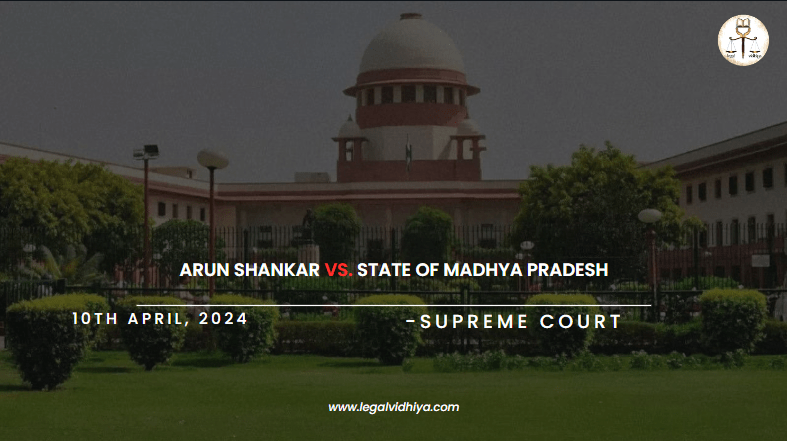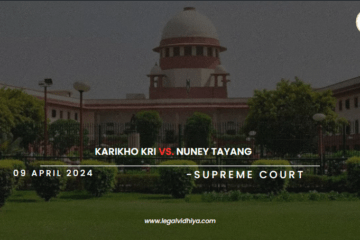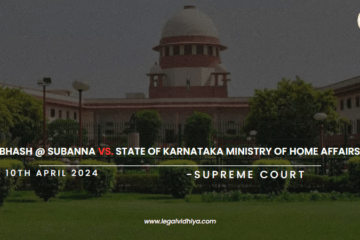
| CITATION | 2024 INSC 298 |
| DATE OF JUDGEMENT | 10th April, 2024 |
| COURT | Supreme Court of India |
| APPELLANT | Arun Shankar |
| RESPONDENT | State of Madhya Pradesh |
| BENCH | J. (Abhay S. Oka) and, J. (Ujjal Bhuyan) |
INTRODUCTION
The case of Arun Shankar vs. State of Madhya Pradesh is a significant legal matter that involves the conviction of Arun Shankar for the murder of Sushildhar Dubey. The case was initially heard by the Sessions Court on March 13, 1995 and the conviction was later upheld by the High Court on December 5, 2017. The case was appealed to the Supreme Court of India and the judgement was delivered on April 10, 2024. Key aspects of the case include the disputed recovery of the alleged murder weapon, the absence of a clear motive for the crime, and doubts raised by the presence of glass shards at the crime scene. The court’s decision emphasized the necessity of meeting strict standards of proof in cases relying on circumstantial evidence and highlighted the principle that an accused must be proven guilty beyond doubt before a conviction can be made.
FACTS OF THE CASE
- The appellant and the deceased (Sushildhar Dubey) were related and residents of village Amgoan. They used to drink liquor together.
- On September 29, 1993 around 7:00 PM. The appellant went to the deceased’s house and asked him to accompany him to drink liquor. They went to the house of PW-2(Ramdas) in village Kohaka, consumed liquor and left.
- The deceased was not seen alive after that. His dead body was found on the morning of September 30, 1993 on the road leading to village Bijholidhar Amgoan.
- The prosecution case was based on circumstantial evidence, including:
- recovery of the knife, allegedly the weapon of assault, at the instance of the appellant.
- The deceased and appellant being last seen together.
- Medical opinion on the injuries and cause of death.
- Their habit of drinking liquor together.
ISSUES RAISED
- Whether the circumstantial evidence presented by the prosecution was sufficient to prove the appellant’s guilt beyond reasonable doubt.
- Whether the recovery of the knife, allegedly the weapon of assault, at the instance of the appellant was duly proved by the prosecution.
- Whether the “last scene together” circumstances was strong enough, given that the appellant and deceased were related and frequently drank liquor together.
- Whether the prosecution established a complete chain of circumstances that was consistent with the hypothesis of the appellant’s guilt and excluded all other possibilities.
- Whether the prosecution proved the existence of motive for the crime.
- Whether the evidence of PW-7 and PW-15 raised a reasonable doubt about the cause of death being an accident, rather than murder.
CONTENTIONS OF APPELLANT
- The circumstantial evidence presented by the prosecution was not sufficient to prove his guilt beyond reasonable doubt. The prosecution failed to establish a complete chain of circumstances that was consistent only with the hypothesis of his guilt and excluded all other possibilities.
- The recovery of the knife, allegedly the weapon of assault, at his instance was not duly proved by the prosecution. There was a lack of sufficient witness testimony to support this recovery.
- The “last scene together” circumstance was very weak, as there was evidence showing that he and the deceased were related and frequently drank liquor together. Their habit of drinking together was a usual occurrence.
- The prosecution did not prove the existence of motive for the crime. The absence of motive weakened the prosecution’s case.
- The oral evidence of PW-7 (Virendradhar Dwivedi) and PW-15 (Dr Mahindra Kumar Ahirwal) raised a reasonable doubt that the doubt could have occurred due to an accident of motorcycle, rather than murder.
- Therefore, the benefit of doubt should be extended to him. The glass shards found at the crime scene complicated the prosecution’s story and created doubt about the circumstances.
CONTENTIONS OF RESPONDENT
- The recovery of the knife and the instance of the appellant presumed to be the weapon used in the assault on the deceased was a crucial piece of evidence in the prosecution’s case. However, the prosecution failed to sufficiently prove this aspect, which weakened their argument.
- The “last scene together” circumstance was highlighted by the prosecution as a significant point in linking the appellant to the crime. This theory suggested that the appellant and the deceased were last seen together before the crime occurred. However, the prosecution’s case was deemed weak due to the absence of a clear motive for the appellant to commit the crime.
- The prosecution aimed to establish a chain of circumstances that would conclusively point to the guilt of the appellant. However, the court found that the prosecution’s case did not provide definite evidence to exclusively support the guilt of the appellant and failed to eliminate other possible explanations for the events.
JUDGEMENT
The Sessions court had convicted the appellant Arun Shankar under sections 302 (murder) and 201 (causing disappearance of evidence) of the Indian Penal Code and sentenced him to life imprisonment. The high court later upheld the conviction and sentence passed by the Sessions Court in its judgement and order dated December 5, 2017. The high court agreed with the lower court’s reliance on the circumstantial evidence presented by prosecution, which included the recovery of the knife allegedly used in the assault, the “last scene together” theory, medical evidence and the habit of the deceased and appellant drinking liquor together.
However, the Supreme Court after carefully examined the prosecution case found several serious flaws. The court determined that the prosecution failed to provide a convincing chain of events, and that the conviction was erroneous. The Supreme Court noted that the recovery of the knife, allegedly the weapon of assault at the instance of the appellant was not duly proved by the prosecution. The lack of sufficient witness testimony to support this recovery was a major weakness. The court also questioned the “last scene together” circumstance as the appellant and deceased were frequently observed drinking together without any apparent conflicts on the day of the occurrence. The court acquitted the appellate finding that the circumstances were not consistent with the hypothesis of his guilt. The court emphasized the strict standards of proof required in circumstantial evidence cases. The appellants charges were dropped with revoked bail bonds. The disputed judgements were reversed and the appeal was allowed.
ANALYSIS
The judgement in the case of Arun Shankar vs. State of Madhya Pradesh sets several significant precedents for future cases:
- Stringent Standards for Convictions Based on Circumstantial Evidence: The case emphasizes the need for conclusive evidence in criminal cases based on circumstantial evidence. The court highlighted the importance of establishing a chain of circumstances that eliminates all other possibilities and is consistent with the guilt of the accused
- Evaluation of Evidence: This precedent highlights the importance of a detailed examination of evidence and the need for courts to scrutinize the prosecution’s case thoroughly to ensure that the standards of proof are met
- Inconsistencies in the Prosecution’s Case: This case underscores the importance of identifying and addressing inconsistencies in the prosecution’s case to ensure that the evidence presented is reliable and consistent.
- The “Last Seen” Approach: This precedent cautions against relying solely on the “last seen” approach and emphasizes the importance of other evidence to establish a strong case.
- The Importance of Motive: The case emphasizes the significance of establishing a clear motive for the crime.
- The Role of Witness Testimony: This precedent emphasizes the need for reliable and consistent witness testimony to support the prosecution’s case.
- The Principle of Innocence Until Proven Guilty: This case reinforces the importance of this principle in ensuring that individuals are not wrongly convicted and that the standards of proof are met in criminal cases.
CONCLUSION
The case of Arun Shankar vs. State of Madhya Pradesh underscores the importance of thorough legal proceedings and the principles of justice. The appellant’s conviction under Sections 302 and 201 of the Indian Penal Code has been reversed by the court. It was determined that the prosecution’s assertion that the firearm had been collected at the appellant’s request was not sufficiently supported by the available evidence. The prosecution’s evidence, the court said, did not prove the appellant’s guilt theory on its own. Because there was inadequate evidence and a reasonable doubt, the appellant was ruled not guilty. The Court granted the appeal and exonerated the appellant of all charges after taking these circumstances into consideration.
The judgement emphasizes the need for conclusive evidence and the requirement that the circumstances must be consistent only with the guilt of the accused. This case serves as a reminder of the stringent standards required in criminal cases and the importance of ensuring that the principles of justice are upheld.
REFERENCES
- https://www.advocatekhoj.com/library/judgments/announcement.php?WID=17479
- https://newslaw.in/case-type/criminal/analyzing-circumstantial-evidence-in-criminal-appeals-case-study-of-arun-shankar-vs-the-state-of-madhya-pradesh/
- SCC ONLINE
This article is written by Priya Patel, student of S.S Khanna Girls’ Degree College, Prayagraj. Intern at Legal Vidhiya.
Disclaimer: The materials provided herein are intended solely for informational purposes. Accessing or using the site or the materials does not establish an attorney-client relationship. The information presented on this site is not to be construed as legal or professional advice, and it should not be relied upon for such purposes or used as a substitute for advice from a licensed attorney in your state. Additionally, the viewpoint presented by the author is of a personal nature.




0 Comments